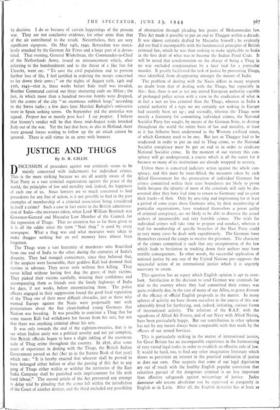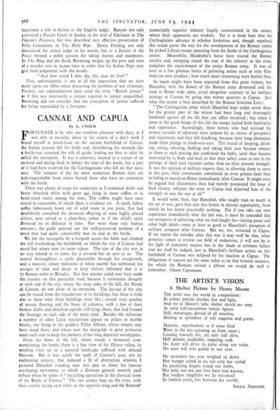JUSTICE AND THUGS
By D. R. GILLIE The Thugs were a vast fraternity of murderers who flourished from one end of India to the other during the centuries of India's disunity. They had tranquil consciences, since they believed that, if the auspices were favourable, their goddess Kali had doomed their victims in advance. They never stole without first killing. They never killed without having first dug the grave of their victims. They picked their victims carefully, winning their confidence and accompanying them as friends over the lonely highways of India for days, if not weeks, before exterminating them. The police officers engaged in their suppression found the good local reputation of the Thug one of their most difficult obstacles, just as those who warned Europe against the Nazis were perpetually met with protestations about the fine clean-limbed young Germans that Nazism was breeding. It was possible to convince a Thug that for some reason Kali had withdrawn her favour from his sect, but not that there was anything criminal about his acts. It was only towards the end of the eighteen-twenties, that is to say when Indian unity was a political novelty and not yet complete, that British officials began to have a slight inkling of the enormous scale of Thug crime throughout the country. In 1836, after some years of experience in dealing with the Thugs, the British Indian Government passed an Act (Act 30 in the Statute Book of that year) which ran: "It is hereby enacted that whoever shall be proved to have belonged either before or after the passing of this Act to any gang of Thugs either within or without the territories of the East India Company shall be punished with imprisonment for life with hard labour." The second article of the Act prevented any attempt to delay trial by pleading that the crime fell within the jurisdiction of the Court of another district, and the third excluded any possibility of obstruction through pleading fine points of Mohammedan law. This Act made it possible to put an end to Thuggec within a decade.
It was almost certainly drafted by Macaulay himself ; he evidently did not find it incompatible with the fundamental principles of British criminal law, which he was then seeking to make applicable to India
in the first draft of what was to become the Indian Penal Code. It will be noted that condemnation on the charge of being a Thug in no way excluded condemnation by a later trial for a particular murder. It greatly facilitated the task of justice by preventing Thugs, once identified, from disappearing amongst the masses of India.
The problem of dealing with the Nazis differs in many respects no doubt from that of dealing with the Thugs, but especially in
this: first, there is not as yet any united European authority capable of prolonged police action with a view to the eradication of what is in fact a sect no less criminal than the Thugs, whereas in India a central authority of a type we are certainly not seeking in Europe had recently been set up ; and secondly, whereas the Thugs were merely a fraternity for committing individual crimes, the National Socialist Party has sought, by means of the German State, to destroy throughout the world the entire basis of law and morality, at least as it has hitherto been understood in the Western civilised states, of which Germany used to be one. But just as Thuggee had to be eradicated in order to put an end to Thug crime, so the National Socialist conspiracy must be put an end to in order to eradicate National Socialist crime. In the moment of our victory this con- spiracy will go underground, a course which is all the easier for it because so many of ets institutions are already wrapped in secrecy.
Unless there is concerted judiciary action against the whole con- spiracy, and this must be inter-Allied, the measures taken by each Allied- Government for the prosecution of individual Germans for crimes committed within their state boundaries are likely to prove futile because the identity of most of the criminals will only be dis- covered after they have had time to return to Germany and to cover their tracks—if then. Only by arre.iting and imprisoning for at least a period of some years those Germans who, by their membership of particular organisations, have rendered themselves a priori guilty of criminal conspiracy, are we likely to be able to discover the actual authors of innumerable and very horrible crimes. The trials for individual crimes will take time to prepare and conduct, whereas a trial for membership of specific branches of the Nazi Party could in very many cases be dealt with expeditiously. The Germans have themselves created the camps to receive the prisoners. The character of the crimes committed is such that any interpretation of the law which leads to hesitation in tracking down their authors may have terrible consequences. In other words, the successful application of national justice by any one of the United Nations pre-supposes the successful action of an international justice which it is urgently necessary to create.
This question has an aspect which English opinion is apt to over- look. Satisfaction at the decision to send German war criminals for trial to the country where they had committed their crimes was quite evidently due, in the case of many of our Allies, to grave distrust of the efficacy of official English proposals in the matter. In many spheres of activity we have shown ourselves in the course of this war admirably fitted for furthering, and, indeed, initiating, various forms of international activity. The relations of the R.A.F. with the squadrons of Allied Air Forces, and of our Navy with Allied Navies, have been particularly happy. But our contribution in other spheres has not by any means always been comparable with that made by the officers of our armed Services.
This is particularly striking in the matter of international justice, for Great Britain has an incomparable experience in the harmonising of very varied legal codes in order to establish an effective rule of law. It would be hard, too, to find any other imaginative literature which shows as persistent an interest in the practical realisation of justice as does our own. One suspects that some of our legal dignitaries are out of touch with the healthy English popular conviction that relentless pursuit of the dangerous criminal is no less important than effective safeguards against miscarriage of justice. hulex damnatur ubi nocens absolvitur can be expressed as pungently in English as in Latin. After all, the English detective has at least as
Important a role in fiction as the English judge. Bunyan not only portrayed a Fascist Court of Justice in the trial of Christian in The Pilgrim's Progress, but also described very effective prosecution of Fifth Columnists in The Holy War. Henry Fielding not only denounced the unjust judge in his novels, but as a Justice of the Peace showed a noble passion for taking thieves and murderers. In The Ring and the Book, Browning weighs up the pros and cons of a murder case in 20s000 lines in order that his Italian Pope may give final judgement with the words:
"And how could I dare die, this man let live?"
That, unfortunately, is not at all the impression that we have made upon our Allies when discussing the problem of war criminals. Further, our representatives have used the term "British justice" as if this was necessarily a variant superior to justice unqualified. Browning did not consider that his conception of justice suffered for being expounded by a foreigner.























 Previous page
Previous page